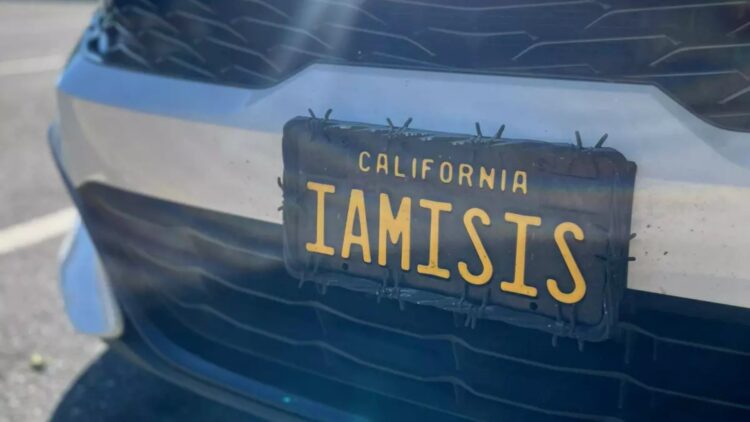The California Department of Motor Vehicles (DMV) allows personalized license plates on vehicles, but they must meet a series of requirements to be accepted. Since 2022, Isis Wharton has paid $50 for her personalized plate, but the DMV has now revoked it for being offensive. It reads “IAMISIS,” which, according to Wharton who told The Times, the DMV considered a risk of inciting violence. The affected woman argues that her name comes from the ancient Egyptian goddess and should not be associated with the terrorist group. However, the DMV can remove concepts that may be perceived differently in different contexts, as is the case here.
Plates can be rejected when the text has sexual or scatological meanings, profane or obscene terms, or conveys messages related to groups of people, sexual orientation, race, religion, disability, among others. Wharton has not been the only one affected, as in 2020 Steve Gordon, the director of the DMW, received complaints from five residents whose personalized plates were not accepted, claiming that the reasons were unconstitutional under the First Amendment. Ultimately, the court ruled in favor of the drivers, whose plates were protected under the First Amendment as private speech.
Personalizing license plates
Vehicle license plate personalization in the state of California is possible as long as a series of requirements established by the California Department of Motor Vehicles (DMV) are met. Isis Wharton, a resident of Sacramento, has paid $50 annually since 2022 for her personalized license plate, which has now been revoked by the DMV. The plate reads “IAMISIS,” which has been considered offensive by the DMV. According to Wharton’s statements to The Times, she received a letter in which the DMV argued, among other things, that her plate “creates a risk of inciting violence”.
The DMV defends its position, claiming that the plate could be interpreted as “I am the Islamic State of Iraq and Syria,” thereby associating it with a transnational terrorist organization responsible for acts of violence around the world. In response to this argument, Wharton stated, “At first, when I opened the letter, I was very surprised that they were doing this after so many years,” she said. “I felt hurt and offended by them, which implies that my name was something that would incite violence.”.
The woman is willing to fight the DMV to preserve her registration, claiming that her name belongs to the ancient Egyptian goddess, who symbolizes healing and maternal love, and that it should not be associated with a terrorist group. “That’s why,” she said, “I choose to fight because I believe this could be a great example of bringing back the powerful and peaceful name Isis and not giving all the negative power to the terrorist group”.
What is the role of the DMV?
By law, the DMV is responsible for individually reviewing personalized license plates and ensuring that they comply with state law. “The DMV understands that language and symbols can have different meanings across cultures and communities,” the statement said. “What may be a term of affection in one context can be perceived differently in another.” The reasons the DMV may reject a license plate are:
- Having a sexual or scatological meaning.
- Be a swear word or a term considered profane or obscene.
- Convey any type of message related to the following characteristics of a group of people: race, ethnic or national origin, color, religion, disability, sexual orientation, or gender identity.
- If the setting contains words related to fighting, or refers to illegal or violent acts, including but not limited to criminal gang affiliation or activity, weapons, genocide, or creates a risk of incitement to violence.
- If it misrepresents an association with the government or law enforcement through any combination of letters or numbers indicating affiliation with an agency or an office or position, including, but not limited to, an elected office, employment as a police officer, firefighter, emergency medical technician, paramedic, or lifeguard.
- If the setting is a word or term that is not English or is slang, or if it is a phonetic spelling or a mirrored image of a word or term that falls into the categories described in the previous sections.
More cases of contested license plates
Wharton has not been the only one affected by this type of ruling, as Steve Gordon, director of the DMV, received five complaints from California residents who were not satisfied with the rejection of their personalized plates. According to the plaintiffs, the agency imposed “speech restrictions based on content and viewpoint” regarding the license plates, which is unconstitutional under the First Amendment. The license plates in question reflected the following terms:
- “OGWOOLF,” which the DMV said “contained a reference to a band”.
- “SLAAYRR,” which the agency said “could be considered threatening, aggressive, or hostile”.
- “QUEER,” which the department said “could be considered offensive, degrading, or express contempt for a specific group or person”.
- “DUKNA” was rejected by the DMV because “it looks or sounds like a dirty word”.
- “BO11LUX” was not allowed because “it has a discernible sexual connotation”.
